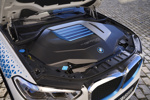Speaking at the World Clean Air Congress in London, Professor Joel Schwartz of Harvard Medical School, questioned EU policies that led to an increase the number of diesel vehicles on the roads.
The new laws, including carbon dioxide-based company car tax, are intended to reduce greenhouse gas emissions.
As a result, twice as many low CO2 emitting diesel cars are sold now than before the new tax regime, with many new vehicles such as the Peugeot 407 seeing as much as 90% of registrations for fleets being diesel.
But according to Schwartz, fine particles can give rise to respiratory problems and have been linked to increased hospital admissions for breathing difficulties, asthma, pneumonia, emphysema and influenza.
They are also associated with heart disease and can reduce life expectancy following long-term exposure.
Schwartz cited a study in the Netherlands that found people living close to busy roads or exposed to black particles from diesel vehicles are at a greater risk of premature death than those living nearby.
He said: ‘Diesel particles are also associated with asthma in children. It’s worth more to reduce one tonne of emissions from transport than from any other sources because traffic particles are emitted close to where people live and breathe.’
The potential health problem could be caused by the fact that the increase in the number of diesel vehicles sold is far outstripping those vehicles sold with particulate filters – such as the new Peugeot 407 – which lessen the number of particles released into the air.
Tim Williamson, policy officer for air pollution campaign group the National Society for Clean Air and Environmental Protection (NSCA), said: ‘This shows the pressing need to integrate policies on climate change and air quality to ensure one doesn’t harm the other.
‘Certainly new diesel standards should require particle filters to be fitted and policy-makers should also look to clean up the existing diesel fleet.’
Williamson added that the Euro IV emissions standard, which all new diesel cars must comply with by next year, was not stringent enough.
He called for the Euro V standard, not due to come into force until 2012 at the earliest, to be brought forward and for the Government to incentivise fleets to buy cars with particulate filters. Schwartz added that hybrid petrol-electric vehicles such as the Toyota Prius and Honda Civic IMA were a better solution than diesel power to improving to air quality.
The comments reignite a row about diesel particles that has been burning for more than two decades.
In a major study in 2002 by the United States Environmental Protection Agency warned that long-term exposure to diesel exhaust emissions could cause lung cancer (Fleet News September 12, 2002).















Login to comment
Comments
No comments have been made yet.